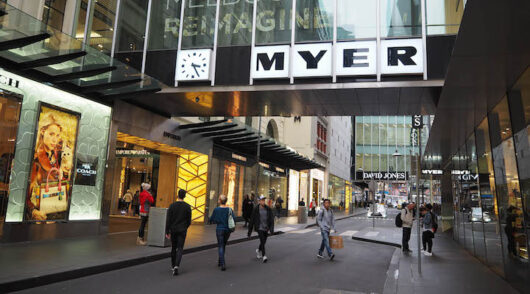Luxury streetwear label Off-White is the latest fashion brand to offer its customers payment with cryptocurrencies at its three flagship stores in Paris, Milan and London. The cryptocurrencies accepted include Bitcoin, Ether, Binance coin, XRP, Tether, and Circle’s USDC. Transactions are managed through a sophisticated digital payment system by Berlin-based technology company Lunu. Off-White is taking necessary steps to ensure it is ready for the next evolution of the internet, Web3, by
by adopting systems that are already familiar to its largest audience segment, Millennials – the fastest-growing user base in the crypto industry.
Off-White creator Virgil Abloh, who died late last year, was exploring various aspects of this new digital frontier within a project dubbed Skyscraper. There were discussions about creating a Decentralised Autonomous Organisation (DAO), a social token and non-fungible tokens (NFTs). LVMH, which took control of Off-White in July 2021 has remained on course with Abloh’s vision, along with the Off-White team.
Upon announcing Off-White would begin accepting cryptocurrency in exchange for apparel and accessories, the popular brand said in a statement: “This is another important step in the growth of the brand, that looks towards the future including Web 3.0 technologies, understanding the needs and desires of its ever-evolving customer base.”
Off-White isn’t the only luxury brand in LVMH’s portfolio embracing premium crypto technology. Swiss luxury watch brand Hublot released a limited-edition watch earlier this year – the Big Bang Unico Ledger – that is intended to attract those interested in both traditional watch craftsmanship and cryptocurrency.
“Hublot has always been first, unique, different and we’re extremely proud and excited to introduce a luxury Swiss-made watch that brings these two passionate, creative worlds together in such an historic, tangible way. History will show the Hublot Big Bang Unico Ledger as a landmark collaboration that set the new standard for forward-thinking people who love watches, crypto and shaping the future,” Hublot CEO Ricardo Guadalupe said.
With only 50 watches made, they are the epitome of rare collectors items. Those who were fortunate enough to secure the Hublot Big Bang Unico Ledger package received three core items: the watch, a limited-edition Ledger Nano X crypto wallet, and a special sapphire watch box.
Buy a Bentley with Bitcoin
As companies start to incorporate blockchain and cryptocurrency technologies into their business and product offerings, more interesting use-cases are becoming commonplace. Growing alongside are fin-tech startups creating highly efficient systems and gadgets to stabilise some of the issues currently preventing widespread adoption.
Bitcoin transaction solution provider NYDIG is helping Texas luxury car dealership Post Oak Motor Cars accept Bitcoin as payment for their luxury vehicles. The innovative purchase option allows customers to buy luxury vehicles financed through loans secured by Bitcoin.
Two of the most well-known problems within the crypto industry are the associated transaction fees and fluctuating cryptocurrencies. These issues are largely due to supply and demand, media hype, and greedy investors.
Off-White and Lunu are making a serious effort to make purchasing physical items in store with cryptocurrency simple and seamless. As transactions are processed, the Lunu point-of-sale terminal swiftly converts the crypto-to-fiat exchange rate at the time of purchase and is compatible with multiple crypto wallets.
You may be wondering about the rationale for buying with crypto when you can use real money to buy physical items. But it’s a fitting move as new trade and ownership models emerge, which ties in with what Abloh may have been working toward with the Skyscraper project.
The next web
The creator economy is powering the boom of NFTs, helping artists and content creators find a unique place online and access new revenue streams. Additionally, it’s shining a light on how these technologies are contributing to the culture economy.
For the most part, the incredible success of NFTs in the past few years has been due to scarcity and status. It’s the age-old notion that people desire something because it’s new, shiny and limited in supply. Seeing images of cartoon apes and 8-bit punks sell for millions of dollars has people scratching their heads in confusion, thinking, “Why on earth would you waste your money?”
But it’s less about images of apes and more about the cultural phenomenon and technology. The focus is on the ability to redistribute power from a handful of companies into communities. The scales are tipping in favour of creators and culture.
It’s worth noting that the acceleration of blockchain and the crypto industry might not be happening without several significant advancements in technology and the evolution of consumer behaviour. To put it simply, we rely heavily on the internet, connect and interact via various platforms on a regular basis, use social media several times a day and consume a vast amount of content.
With the rise of social media came business opportunities. Many creators and marketers have found fulfilling careers in social media and built highly successful businesses off those platforms alone. The same can be said for the crypto industry and everyone who has gravitated towards it. This space offers deep community engagement and an ability to connect on shared views and have a stake in a community’s future. And it is all built on decentralised networks to distribute ownership equally.
While Abloh is no longer at the helm, his legacy includes championing artists, the creator economy, and offering new ways of trading products to participate in the World Wide Web’s next evolution, and Off-White. The unapologetic luxury streetwear label is proving it is culturally aligned to today’s customer and technologically prepared for the youth of tomorrow.







